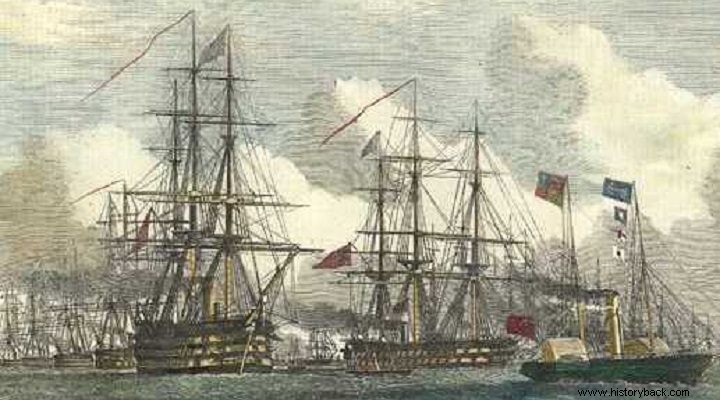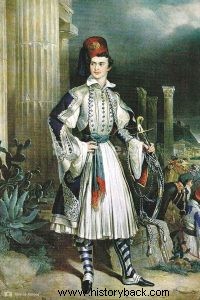
After the assassination of Kapodistrias and the civil war that followed, the great powers intervened again, choosing the monarch of Greece, the politically harmless Prince of Bavaria, Otto. From 1832 when he assumed power in Greece, Othonas tried to balance the policies of the three, mainly, "protector" powers, exploiting the antagonisms between them and relying on the representatives of the three foreign parties operating in Greece.
However, when Otto tried to disengage from the suffocating British embrace, developing Greek shipping, competing with the British in the Mediterranean, the latter reacted strongly, applying, for the first time, but unfortunately not the last time, against Greece, the policy of the "gunboats" .
The first point of friction discovered by the British was their territorial claims over the islands of Elafonisos and Sapienza, which, as they argued, belonged to the Ionian island complex and were therefore wrongly incorporated into the Greek kingdom. The British first raised the issue of the islands in 1938. They came back in force, through their ambassador Lyons, in 1843 and continued the pressure from then until 1850.
Finley, Pacifico, Parkerika
In these circumstances, the dispute broke out between the Greek government and the philhellenic and well-known historian George Finley, who claimed from Greece the incredible amount of 45,000 drachmas at the time, as compensation for the expropriation of his estates, for the creation of Royal Garden.
A third and completely fabricated reason for the British intervention were the incidents against the British citizen David Pacifiko, whose house in Athens was actually ransacked by the mob on Easter 1849.
Pacifiko, apparently acting in consultation with the British embassy, demanded compensation from the Greek government of 887,000 drachmas, an incredibly high sum for the time – to give an idea of the amount, it is stated that the original share capital of the Bank of Greece which had been established in 1841 it amounted to 5 million drachmas!
In other words, Pacifico, under British guidance, wanted to blow up the Greek economy! Naturally, the Greek government refused to grant Pacifico's absurd request, who fled to the British embassy, where he was not only listened to, but for his sake. The British Mediterranean Fleet, under Admiral Parker, blockaded the main Greek ports – Piraeus, Hermoupolis of Syros, Patras, Corinth - demanding the satisfaction of Pacifico's and Finley's demands and the return of the two islands to Britain.
Greece, unable to confront the British, contented itself with responding with a written protest. The letter sent by then Secretary of State Andreas Londos to Admiral Parker stated:"Against the acts which have taken place on the part of a force which my Government have neither the means nor the will to oppose, I protest in the name of His Majesty the King of Greece, my respected sir and in the name of the most sacred principles of the law of nations, against the violence that you commit according to your orders in the Greek country. And I make you responsible for every consequence of this insult you commit in time of peace to the independence of my country and the dignity of my ruler".
Greece, however, despite the strength of the opponent and the magnitude of the insult, did not succumb to British pressure. The Greek people faced the insult as a whole. University students formed classroom patrol groups. The officers resigned from their payroll and made their salaries available to the state.
The followers of the English party deserted it en masse. "There is a change in France, Colettis also died earlier, then Palmerston (the British Prime Minister at the time) prepares an important fleet of vazzelas (bicrotas), with ferries, with barges and troops and Parker the admiral and they come to Piraeus and Ambelaki (Salamina) and make a close blockade of us, on the grounds that we have damaged Obraion and Finlay.
"And they take all the national and commercial ships and destroy the trade in general and the unhappy islanders. And they made us all housewives. And they feared today they will move through the capital and tomorrow they will move. The comma the English impossible. He died from the hatred of the people.
"And the whole nation united against them. And God, where he saved us so many times, saved us then as well", said general Makrygiannis, who lived through the events. Eventually the French and Russians, whose trade was also suffering, intervened and put diplomatic pressure on the British, forcing them to lift the blockade. Pacifiko was compensated with 3,850 drachmas.
Crimean War
The first harsh and revelatory for many Greeks who still believed in "protecting powers and foreign Philhellenes" blackmail of 1848-50 would, unfortunately, have a continuation and even worse. In 1853, on the occasion of the protection of the Orthodox in the Holy Land, a new Russo-Turkish War broke out, which developed into the so-called Crimean War.
The Russians crushed the Turkish fleet in Sinop, in September 1853, provoking the strong reaction of the British and French, who for no reason wanted a defeat of the Ottomans, which would entail the strengthening of Russia and perhaps its dominance in the Dardanelles Straits.
So they first warned Russia to stop the war with the Turks. When the tsar refused they declared war on him, allying with the Turks and the Italians of the Kingdom of Piedmont. The Greeks, from Othona to the last shepherd, saw in the outbreak of war a golden opportunity to continue the struggle for the liberation of the Motherland that had begun in 1821.
However, they counted without the foreign "protectors". From the beginning of the war, as soon as the British and French realized the intentions of the Greeks, they warned Otho to stop all movement. But the Greeks had already revolted in Thessaly, Epirus and Macedonia and had put the Turks to flight. Then the "protecting" forces intervened.
Initially they blockaded Piraeus with their fleets, having also secured the consent of Austria, which also feared the strengthening of Russia. On May 12, 1854, French and British troops – about 4,000 men – occupied Piraeus without a fight and forced Otto to renounce the Greek rebels and declare Greek neutrality!
They also forced him to form a new government, the "Ministry of Occupation", as it was called, appointing as prime minister the leader of the English party, Alexander Mavrokordatos, who worked "charitably" to suppress the revolutions that had broken out in the Turkish-occupied Macedonia, Epirus and Thessaly.
Collaborating with him was the man of the French in Greece, Colonel Kallergis, the executor of the "spontaneous" revolution of 1843, who had now developed into a real dictator of Greece, relying on French bayonets. In fact, when Othon tried to react, Kallergis did not hesitate to suggest to the French the capture of Athens as well!
In the meantime, the British, but mainly the French military, made sure to make the Greeks as unpleasant as possible with their provocative behavior and their constant provocations. The situation worsened when they brought their men sick with cholera from the Crimea to Piraeus.
Soon the epidemic hit the Greeks as well. At least 10% of the inhabitants of Athens died from imported cholera. In Piraeus the mortality was higher! Finally, although the Crimean War officially ended on March 18, 1856, with the signing of the Treaty of Paris, the occupation troops remained in Greece until February 1857.
The total number of Greeks who died from cholera and the consequences of the blockade in this period is not known. But it certainly amounts to several thousand – only 3,000 died in Athens from cholera.
But the worst thing was that it was clearly seen that Greece was exposed to the appetites of the great powers, who wanted it just as a client state and nothing more. The positive from the horrible experience of the occupation was the collapse of the foreign parties. However, the Greeks did not get the message.

King Othon.
